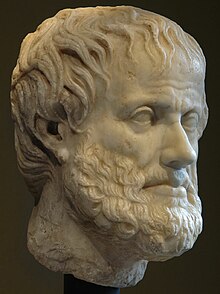What does Eudaimonia mean?
Definitions for Eudaimonia
eu·dai·mo·ni·a
This dictionary definitions page includes all the possible meanings, example usage and translations of the word Eudaimonia.
Princeton's WordNet
wellbeing, well-being, welfare, upbeat, eudaemonia, eudaimonianoun
a contented state of being happy and healthy and prosperous
"the town was finally on the upbeat after our recent troubles"
Wikipedia
Eudaimonia
Eudaimonia (Greek: εὐδαιμονία [eu̯dai̯moníaː]), sometimes anglicized as eudaemonia or eudemonia, is a Greek word commonly translated as happiness or welfare; however, "human flourishing or prosperity" has been proposed as a more accurate translation. Etymologically, it consists of the words "eu" ("good") and "daimōn" ("spirit"). It is a central concept in Aristotelian ethics and political philosophy, along with the terms "aretē", most often translated as "virtue" or "excellence", and "phronesis", often translated as "practical or ethical wisdom". In Aristotle's works, eudaimonia (based on older Greek tradition) was used as the term for the highest human good, and so it is the aim of practical philosophy, including ethics and political philosophy, to consider (and also experience) what it really is, and how it can be achieved. Discussion of the links between virtue of character (ēthikē aretē) and happiness (eudaimonia) is one of the central concerns of ancient ethics, and a subject of much disagreement. As a result there are many varieties of eudaimonism. Two of the most influential forms are those of Aristotle and the Stoics. Aristotle takes virtue and its exercise to be the most important constituent in eudaimonia but acknowledges also the importance of external goods such as health, wealth, and beauty. By contrast, the Stoics make virtue necessary and sufficient for eudaimonia and thus deny the necessity of external goods.
ChatGPT
eudaimonia
Eudaimonia is a Greek word that is often translated as "happiness," "well-being," or "flourishing." It is a central concept in ancient Greek philosophy, particularly in the works of Aristotle, and it refers to a state of personal fulfillment or the attainment of the highest good in life. Eudaimonia implies living in a way that is in accordance with one's true nature and in harmony with the world around one. It is viewed as the ultimate goal or purpose of human life.
Wikidata
Eudaimonia
Eudaimonia or eudaemonia, sometimes anglicized as eudemonia, is a Greek word commonly translated as happiness or welfare; however, "human flourishing" has been proposed as a more accurate translation. Etymologically, it consists of the words "eu" and "daimōn". It is a central concept in Aristotelian ethics and political philosophy, along with the terms "aretē", most often translated as "virtue" or "excellence", and "phronesis", often translated as "practical or ethical wisdom". In Aristotle's works, eudaimonia was used as the term for the highest human good, and so it is the aim of practical philosophy, including ethics and political philosophy, to consider what it really is, and how it can be achieved. Discussion of the links between virtue of character and happiness is one of the central preoccupations of ancient ethics, and a subject of much disagreement. As a result there are many varieties of eudaimonism. Two of the most influential forms are those of Aristotle and the Stoics. Aristotle takes virtue and its exercise to be the most important constituent in eudaimonia but acknowledges also the importance of external goods such as health, wealth, and beauty. By contrast, the Stoics make virtue necessary and sufficient for eudaimonia and thus deny the necessity of external goods.
Matched Categories
Usage in printed sourcesFrom:
- [["1836","4"],["1856","3"],["1859","1"],["1863","1"],["1875","2"],["1876","3"],["1880","1"],["1883","4"],["1886","2"],["1887","2"],["1888","3"],["1889","2"],["1890","1"],["1891","7"],["1893","1"],["1895","5"],["1896","3"],["1898","1"],["1901","5"],["1903","1"],["1904","1"],["1905","7"],["1906","3"],["1908","14"],["1909","8"],["1910","3"],["1912","3"],["1913","5"],["1915","1"],["1916","3"],["1917","14"],["1918","7"],["1919","3"],["1920","2"],["1921","28"],["1922","5"],["1923","12"],["1924","9"],["1925","3"],["1926","5"],["1927","4"],["1928","13"],["1929","6"],["1930","1"],["1931","4"],["1932","9"],["1933","3"],["1934","4"],["1935","23"],["1936","3"],["1937","8"],["1938","3"],["1939","32"],["1940","9"],["1941","4"],["1942","3"],["1943","34"],["1944","57"],["1945","58"],["1946","43"],["1947","45"],["1948","29"],["1949","31"],["1950","23"],["1951","32"],["1952","30"],["1953","8"],["1954","13"],["1955","21"],["1956","66"],["1957","7"],["1958","71"],["1959","55"],["1960","37"],["1961","18"],["1962","56"],["1963","74"],["1964","49"],["1965","89"],["1966","61"],["1967","48"],["1968","108"],["1969","44"],["1970","328"],["1971","96"],["1972","197"],["1973","51"],["1974","54"],["1975","370"],["1976","165"],["1977","208"],["1978","103"],["1979","66"],["1980","784"],["1981","182"],["1982","180"],["1983","451"],["1984","328"],["1985","156"],["1986","353"],["1987","195"],["1988","420"],["1989","633"],["1990","891"],["1991","556"],["1992","956"],["1993","434"],["1994","668"],["1995","2164"],["1996","1090"],["1997","1512"],["1998","1902"],["1999","1473"],["2000","1516"],["2001","1478"],["2002","1419"],["2003","1959"],["2004","1375"],["2005","2626"],["2006","2812"],["2007","2420"],["2008","1785"]]
Numerology
Chaldean Numerology
The numerical value of Eudaimonia in Chaldean Numerology is: 8
Pythagorean Numerology
The numerical value of Eudaimonia in Pythagorean Numerology is: 2
Translations for Eudaimonia
From our Multilingual Translation Dictionary
Get even more translations for Eudaimonia »
Translation
Find a translation for the Eudaimonia definition in other languages:
Select another language:
- - Select -
- 简体中文 (Chinese - Simplified)
- 繁體中文 (Chinese - Traditional)
- Español (Spanish)
- Esperanto (Esperanto)
- 日本語 (Japanese)
- Português (Portuguese)
- Deutsch (German)
- العربية (Arabic)
- Français (French)
- Русский (Russian)
- ಕನ್ನಡ (Kannada)
- 한국어 (Korean)
- עברית (Hebrew)
- Gaeilge (Irish)
- Українська (Ukrainian)
- اردو (Urdu)
- Magyar (Hungarian)
- मानक हिन्दी (Hindi)
- Indonesia (Indonesian)
- Italiano (Italian)
- தமிழ் (Tamil)
- Türkçe (Turkish)
- తెలుగు (Telugu)
- ภาษาไทย (Thai)
- Tiếng Việt (Vietnamese)
- Čeština (Czech)
- Polski (Polish)
- Bahasa Indonesia (Indonesian)
- Românește (Romanian)
- Nederlands (Dutch)
- Ελληνικά (Greek)
- Latinum (Latin)
- Svenska (Swedish)
- Dansk (Danish)
- Suomi (Finnish)
- فارسی (Persian)
- ייִדיש (Yiddish)
- հայերեն (Armenian)
- Norsk (Norwegian)
- English (English)
Word of the Day
Would you like us to send you a FREE new word definition delivered to your inbox daily?
Citation
Use the citation below to add this definition to your bibliography:
Style:MLAChicagoAPA
"Eudaimonia." Definitions.net. STANDS4 LLC, 2024. Web. 22 Nov. 2024. <https://www.definitions.net/definition/Eudaimonia>.



Discuss these Eudaimonia definitions with the community:
Report Comment
We're doing our best to make sure our content is useful, accurate and safe.
If by any chance you spot an inappropriate comment while navigating through our website please use this form to let us know, and we'll take care of it shortly.
Attachment
You need to be logged in to favorite.
Log In